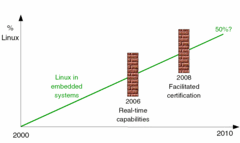Dates and Events:
|
OSADL Articles:
2023-11-12 12:00
Open Source License Obligations Checklists even better nowImport the checklists to other tools, create context diffs and merged lists
2022-07-11 12:00
Call for participation in phase #4 of Open Source OPC UA open62541 support projectLetter of Intent fulfills wish list from recent survey
2022-01-13 12:00
Phase #3 of OSADL project on OPC UA PubSub over TSN successfully completedAnother important milestone on the way to interoperable Open Source real-time Ethernet has been reached
2021-02-09 12:00
Open Source OPC UA PubSub over TSN project phase #3 launchedLetter of Intent with call for participation is now available |
Safety Critical Linux
Nicholas Mc Guire joins the OSADL team
We are extremely glad to report that Professor Nicholas Mc Guire (aka "Der Herr Hofrat") has joined the OSADL team and has established a project to create a working group on Safety Critical Linux. Read more about this project here. You can reach Nicholas Mc Guire at OSADL in his function of the OSADL Safety Coordinator using this email address.
What is the rationale behind these activities?
There are many good reasons to use the Linux operating system in embedded systems. However, Linux did and does not provide everything that is needed for this purpose. One of the important issues is the real-time performance of the Linux kernel - but this has mostly been resolved with the advent of real-time extensions such as RTAI and Xenomai and with Ingo Molnar's and Thomas Gleixner's realtime-preempt patches. The remaining about 40% of the latter will probably be included in the mainline kernel until the end of the year. One of the next important issues is certification. Up to now, it is not impossible but rather expensive and time-consuming to undergo the certification procedure for a project that uses the Linux kernel under mission and safety critical conditions. The Safety Critical Linux working group led by Professor Mc Guire will provide the means to facilitate the certification procedure of the Linux kernel.
With the two issues, real-time performance and certification, solved, it is well conceivable that Linux will be used in more than 50% of the embeded systems worldwide by 2010.






